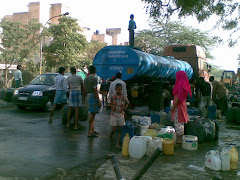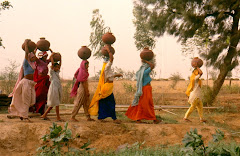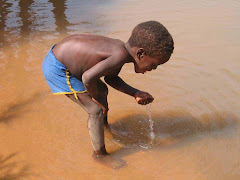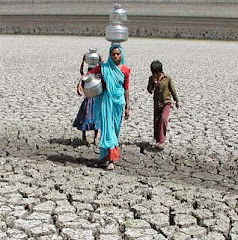Water scarcity is giving rise to conflicts. Among people, within nations and between nations. At places, these conflicts are leading to growing instability among people. As is evident in the Middle East.
But, a leading expert in water resource policy and conflict resolution says though conflicts over water are at the heart of regional instability, they could become catalyst for cooperation and peace, if managed properly.
There is a growing tendency to cooperate over water even though politicians have threatened to take to the battlefield over the precious resource, he added. "Two thirds of the time we do anything over shared water, we cooperate. That is hugely important," said Programme Director in Water Conflict Management and Transformation at Oregon State University, Aaron Wolfe.
He feels that water turfs just lead to mere posturing by politicians of all hues. The last formal war over water was fought in 2,500 B.C. between two Sumerian city-states contesting the Tigris basin, he said recently at the United Nations General Assembly.
The problem, he says, is that water is often managed unilaterally and thus inefficiently, and is used to exacerbate tensions. Water itself did not respect political boundaries, but governments used man-made borders to protect their sovereignty, economies and nationalities.
Also, policy discussions over water issues focused too much on global trends and solutions, while neglecting the regional and sub-regional water disputes that were a real security concern, responsible for poverty, disease and degradation in many parts of the world.
His comments come as a whiff of fresh air after reports and comments, including the United Nations, warning that water stress, amplified by climate change, was likely to pose a mounting security challenge in the years to come.
The struggle for water could threaten fragile states and drive regional rivalry, the UN had warned in the third edition of World Water Development Report, entitled 'Water in a changing world', which was released during the World Water Forum at Istanbul in March 2009.
More than 1 billion people lack access to safe drinking water and 2.4 billion, or about half the world’s population, has no access to basic sanitation.
Every year, water-related ailments make some 250 million people sick and claim the lives of 2.2-5 million more. These statistics provide a powder keg good enough to explode and divide a humanity already divided. But, would the misery and pain by chance bring us together?
Wednesday, November 25, 2009
Subscribe to:
Post Comments (Atom)

.jpg)



No comments:
Post a Comment